 The Stages of Change Model
The Stages of Change Model
The Stages of Change model has proven very helpful in understanding how ready people are to change and to help create change. The Stages of Change Model was originally developed in the late 1970’s and early 1980’s by James Prochaska and Carlo DiClemente at the University of Rhode Island when they were studying how smokers were able to give up their habits or addiction.
This model has been applied to a broad range of behaviors including weight loss, injury prevention, overcoming alcohol, and drug problems among others.
The idea behind the Stages of change model is that behavior change does not happen in one step. Rather, people tend to progress through different stages on their way to successful change. Also, each of us progresses through the stages at our own rate.
The stages of change are:
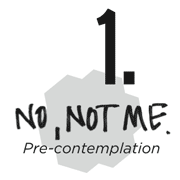 Pre-contemplation
Pre-contemplation
In this stage, you are not thinking much at all about changing. You may not be fully aware of the ways in which your lifestyle is problematic. This can also relate to a patient with a too tight Lap Band and refuses to have some fill removed in order to move forward. This is the “in denial” stage. With weight problems, many people end up in the pre-contemplation stage after many attempts at dieting that didn’t work, leading them to give up or contemplating having their band removed.
 Contemplation
Contemplation
Acknowledging that there is a problem but not yet ready or sure of wanting to make a change or not sure of how to start to make changes. There is no longer the rose colored glasses that have been obscuring the “problem”. However, there is a lot of ambivalence here. It’s a person realizing all of the work that it is going to take to really change. Giving up a behavior that is familiar can be emotional. If a person’s only coping mechanism has been eating, drinking, using sarcasm as a defense mechanism, you name it… there is going to be emotion over giving this thing up.
 Preparation
Preparation
In this stage, you have decided to change your lifestyle and are getting ready to take action within the next month. This is when information collection begins. You may have experience in your life deciding “I’m going to change _____” but then you never develop a plan and you fail. You cycled through pre-contemplation and contemplation, but never entered preparation. This stage is marked by small changes the equivalent of dipping your big toe into a pool to check the temperature. A plan is also developed. Changers begin doing the research needed to make a permanent change. You are starting to motivate yourself to the possibility and process of change. You are working on putting the pieces in place (planning exercise possibilities, menu changes etc.)
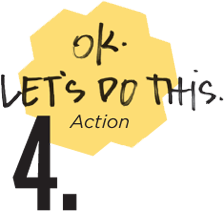 Action
Action
In this stage, you are actively changing your behaviors & lifestyle. You are working diligently at making changes by following a plan of action. And taking steps to improve and track your progress. This is where the actual change occurs. The car has been moved out of neutral and is fully in drive now. People start noticing this change. It’s important that outside support is found and rewarded for success in change. If you’re trying to lose weight, people notice the changes you’re making inside and out.
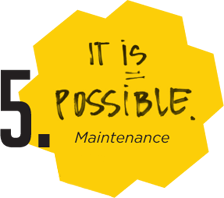 Maintenance
Maintenance
In this stage, you have successfully changed your lifestyle and now you are working to keep up the positive changes and prevent relapse. This is when all those small steps start to pay off. The day by day struggle is easier now that new habits have had time to form. This is the new normal. This is also a tough stage to maintain over time. It’s getting out of bed for a morning workout EVERY DAY. It’s abstaining from substances which are bad for you, no matter the temptation. You’ve seen the good things the change does for you in your daily life and you understand it’s better to keep up this behavior then to revert back. But this is the stage you have to be the most diligent !!! This is the place where a lot of people get over confident with their past success and often relapse when the new behaviors are set aside.
 But unfortunately there is one more stage of change you may be all too familiar with…
But unfortunately there is one more stage of change you may be all too familiar with…
Relapse
Returning to older behaviors and abandoning the new changes. Life gets in the way! When we encounter tough stressful times it is easy to fall back into old patterns without a solid foundation to the new changes
Each stage suggests a different course of action:
 Stage One: Pre contemplation
Stage One: Pre contemplation
In the pre-contemplation stage, people are not thinking seriously about changing and are not interested in any kind of help. People in this stage tend to defend their current bad habit(s) and do not feel it is a problem. They may be defensive in the face of other people’s efforts to pressure them to change.
Are you in the pre-contemplation stage? Probably not, because the fact that you are reading this shows that you are already ready to consider that you may have a problem with one or more bad habits. (Of course, you may be reading this because you have a loved one who is still in the pre-contemplation stage. If this is the case, keep reading for suggestions about how you can help others progress through their stages of change)
If feels nice not to have to worry about changing anything, and of course much of the time if you are content with your life, that’s a good thing! However, there are major long-term consequences to unhealthy lifestyle patterns, and most people regret those patterns once they have to face the consequences.
It’s worth evaluating your lifestyle, consider if there are problem areas that need much more improvement.
Some things to evaluate are:
- • Are you getting exercise most days of the week where your heart rate is up for about 30-60 minutes?
- • Are you consistently eating veggies, whole grains, fruits, lean protein, and healthy fats?
- • Are you at an appropriate weight for your height?
- • Is your waist measurement less than 35 in (for women) or 40 in (for men)?
- • Do you have energy throughout the day?
- • Are you getting a consistent 8-9 hours of sleep per night?
- • Is your blood pressure & cholesterol within healthy limits?
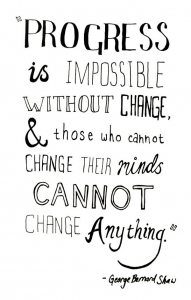 If you answer no to most of these questions, it’s time to do some hard thinking about how you want to live your life and what you want your health to be like in the future. I am sure your decision to have Lap Band surgery was because you had some concerns about your health and wanted a way to bring about a positive change. Maybe you had some trouble in the past following through with making those healthy changes. This can be scary and make you feel anxious, sad, angry, or other negative emotions. Also making a commitment to change can also bring on feelings of having to say goodby to foods you enjoy. Or changing routines like having drinks after work with friends or other social events where food is a big part of the gathering. After all eating is a very pleasurable sensation. It’s best to let yourself feel these feelings (a big part of this stage is not thinking about problems because you want to avoid these negative feelings). But with change is learning to incorporate new routines that still allow for fun and eating favorite foods in moderation instead of giving them up all together. It can help to talk to a trusted friend or a health professional that can help you consider everything!
If you answer no to most of these questions, it’s time to do some hard thinking about how you want to live your life and what you want your health to be like in the future. I am sure your decision to have Lap Band surgery was because you had some concerns about your health and wanted a way to bring about a positive change. Maybe you had some trouble in the past following through with making those healthy changes. This can be scary and make you feel anxious, sad, angry, or other negative emotions. Also making a commitment to change can also bring on feelings of having to say goodby to foods you enjoy. Or changing routines like having drinks after work with friends or other social events where food is a big part of the gathering. After all eating is a very pleasurable sensation. It’s best to let yourself feel these feelings (a big part of this stage is not thinking about problems because you want to avoid these negative feelings). But with change is learning to incorporate new routines that still allow for fun and eating favorite foods in moderation instead of giving them up all together. It can help to talk to a trusted friend or a health professional that can help you consider everything!
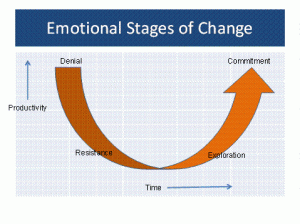 Stage Two: Contemplation
Stage Two: Contemplation
In the contemplation stage people are more aware of the personal consequences of their bad habit and they spend time thinking about their problem. Although they are able to consider the possibility of changing, they tend to be ambivalent about it.
You think changing is a good idea, but it is hard to get started. It can be helpful to write out pros and cons for your current lifestyle and pros and cons for lifestyle changes. There are real reasons why you aren’t quite ready to change yet.
One common reason is that change is hard. It takes a lot of effort to get started exercising, planning meals, and finding different ways to cope with stress. This is especially the case when your life is already overwhelming, too busy, and super stressful. If this is the case for you, is there anything that you can (for now) give up? One of the great benefits of a healthier lifestyle is that everything in your life will become easier to deal with. You’ll think more clearly, have more energy to deal with life’s responsibilities, and feel better about yourself. However, the change process itself is still stressful & require time & effort. For some people, this might mean going pretty slow and taking especially small steps. However, if you can even get started with the small steps you will be moving in the right direction and can be very proud of yourself for that.
 Another common reason is that you enjoy your current behaviors. It is fun to go out and eat of the “forbidden fruit” you would normally have to limit to maintain your weight loss and progress. Sometimes you want to act and feel like the so called “normal” people do. It’s nice to go home and just stretch out in front of the TV rather than cook a healthy meal. It feels great staying in bed an extra hour rather than getting up to go exercise. It is really normal to feel this way. It helps to realize that you don’t have to give these things up 100%, but in order to have a healthy lifestyle; the truth is that you’ll need to replace some unhealthy habits with healthy habits most of the time. An important step is to face what that means, the bad feelings you have when giving something up (can be sadness, anger, fear, etc.) realize you can handle the bad feelings, and ask yourself what is the reward for this change?
Another common reason is that you enjoy your current behaviors. It is fun to go out and eat of the “forbidden fruit” you would normally have to limit to maintain your weight loss and progress. Sometimes you want to act and feel like the so called “normal” people do. It’s nice to go home and just stretch out in front of the TV rather than cook a healthy meal. It feels great staying in bed an extra hour rather than getting up to go exercise. It is really normal to feel this way. It helps to realize that you don’t have to give these things up 100%, but in order to have a healthy lifestyle; the truth is that you’ll need to replace some unhealthy habits with healthy habits most of the time. An important step is to face what that means, the bad feelings you have when giving something up (can be sadness, anger, fear, etc.) realize you can handle the bad feelings, and ask yourself what is the reward for this change?
A final common reason is that you don’t feel like you can succeed. As described in the pre-contemplation section, this is really common with weight problems. However, you really can change! Change happens when you make smart, gradual changes and don’t give up on yourself when you stumble a bit.
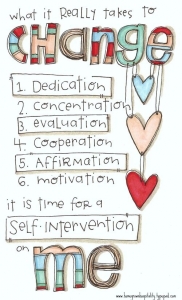 Stage Three: Preparation/Determination
Stage Three: Preparation/Determination
In the preparation/determination stage, people have made a commitment to make a change. Their motivation for changing is reflected by statements such as: “I’ve got to do something about this – this is serious. Something has to change. What can I do?”
This is sort of a research phase: people are now taking small steps toward cessation. They are trying to gather information (sometimes by reading things like this) about what they will need to do to change their behavior. Too often, people skip this stage: they try to move directly from contemplation into action and fall flat on their faces because they haven’t adequately researched or accepted what it is going to take to make this major lifestyle change. This is where I have seen the evidence of this choice in some of the patients I have counseled. They may have rushed in to their decision to have Lap Band surgery thinking all their weight problems (and life’s problems) will be solved without ever considering the responsibility to change as a result of that decision.
If you are now ready but have not begun yet, now is a great time to get a support system in place. Tell supportive people in your life what you are planning to do, and how they can help (and what won’t be helpful).
It’s also a good time to envision & plan for barriers & difficulties you’re likely to experience along the way.
- • How will you find extra time in your day?
- • What happens if you get sick or injured?
- • What if big & important projects come up at school or work?
- • How will your kids deal with changes in your lifestyle?
Change is hard, and you are more likely to be successful if you are prepared to deal with problems that come up along the way. If you overlooked being prepared the first time, now is your chance to start fresh with a well prepared plan of action and renewed dedication.
 Stage Four: Action/Willpower
Stage Four: Action/Willpower
You’re doing it! Great job! Any action at all is in the right direction. This is the stage where people believe they have the ability to change their behavior and are actively involved in taking steps to change their bad behavior by using a variety of different techniques.
Mentally, they review their commitment to themselves and develop plans to deal with both personal and external pressures that may lead to slips. They may use short-term rewards to sustain their motivation, and analyze their behavior change efforts in a way that enhances their self-confidence. People in this stage also tend to be open to receiving help and are also likely to seek support from others (a very important element). This step can be very rewarding as you continue to make changes you can see and feel the results, this helps spur on your motivation to continue.
 Stage Five: Maintenance
Stage Five: Maintenance
Congratulations on your success! This is a great stage to be in, but it can be challenging as well. It was easy to feel great about all the changes you were making in the action stage when you were getting positive results. In the maintenance stage, you are no longer seeing so many new positive results, and you may be likely to focus more on negative feelings and discouragement when you slip up (which everybody does!). Work to notice the positive and remind yourself how much you’ve accomplished. Seek out new goals that you can feel positive about achieving. If you do slip up, remember that you are human and that’s part of the deal. Slip ups will happen, what matters is how you deal with them. Be kind to yourself. It’s worth noting that most successful changers go back and forth between stages a few times. You may be in the maintenance stage, and experience a setback, start back at contemplation, then go to action, then go to maintenance again. That is okay. Don’t give up on yourself. People in this stage tend to remind themselves of how much progress they have made.
 People in maintenance constantly reformulate the rules of their lives and are acquiring new skills to deal with life and avoid relapse. They are able to anticipate the situations in which a relapse could occur and prepare coping strategies in advance.
People in maintenance constantly reformulate the rules of their lives and are acquiring new skills to deal with life and avoid relapse. They are able to anticipate the situations in which a relapse could occur and prepare coping strategies in advance.
They remain aware that what they are striving for is personally worthwhile and meaningful. They are patient with themselves and recognize that it often takes a while to let go of old behavior patterns and practice new ones until they are second nature to them. Even though they may have thoughts of returning to their old bad habits, they resist the temptation and stay on track.
As you progress through your own stages of change, it can be helpful to re-evaluate your progress in moving up and down through these stages.
 Relapse
Relapse
Along the way to permanent change or a reduction of unhealthy habits, most people experience relapse. In fact, it is much more common to have at least one relapse than not. Relapse is often accompanied by feelings of discouragement and seeing oneself as a failure.
While relapse can be discouraging, the majority of people who successfully change do not follow a straight path to a life time free of the old bad habits. Rather, they cycle through the five stages several times before achieving a stable life style change. Consequently, the Stages of Change Model considers relapse to be normal.
There is a real risk that people who relapse will experience an immediate sense of failure that can seriously undermine their self-confidence. The important thing is that if they do slip and say, start to gain back weight after a prolonged departure from the newly formed habits, they shouldn’t see themselves as having failed. Rather, they should analyze how the slip happened and use it as an opportunity to learn how to cope differently. In fact, relapses can be important opportunities for learning and becoming stronger.
 Relapsing is like falling off a horse – the best thing you can do is get right back on again. However, if you do “fall off the horse” and relapse, it is important that you do not fall back to the pre-contemplation or contemplation stages. Rather, restart the process again at preparation, action or even the maintenance stages.
Relapsing is like falling off a horse – the best thing you can do is get right back on again. However, if you do “fall off the horse” and relapse, it is important that you do not fall back to the pre-contemplation or contemplation stages. Rather, restart the process again at preparation, action or even the maintenance stages.
People who have relapsed may need to learn to anticipate high-risk situations (such as being with their family) more effectively, control environmental cues that tempt them to engage in their bad habits (such as being around family celebrations and special occasions), and learn how to handle unexpected episodes of stress without returning to the bad habit. This gives them a stronger sense of self control and the ability to get back on track.
In addition, there is one more stage…
 Transcendence
Transcendence
Eventually, if you “maintain maintenance” long enough, you will reach a point where you will be able to work with your emotions and understand your own behavior and view it in a new light. This is the stage of “transcendence,” to a new life. In this stage, not only is your bad habit no longer an integral part of your life but to return to it would seem atypical, abnormal, even weird to you.
When you reach this point in your process of change, you will know that you have transcended the old bad habits and that you are truly becoming a new “you”, who no longer needs the old behaviors to sustain yourself.
Are you ready to get started?


